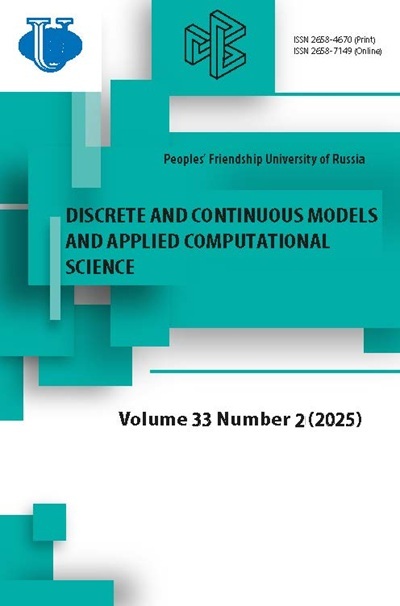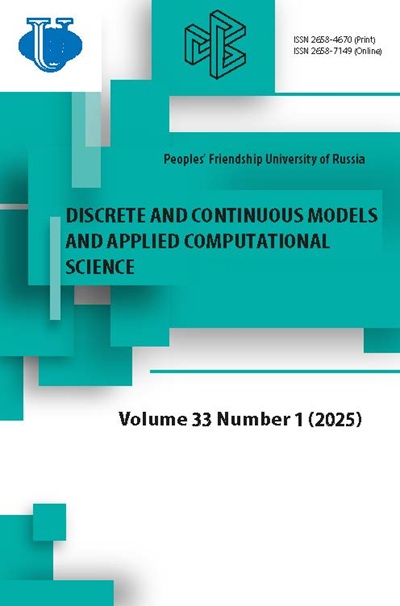On the methods of minimizing the risks of implementing artificial intelligence in the financial business of a company
- Authors: Shchetinin E.Y.1, Sevastianov L.A.2,3, Demidova A.V.2, Velieva T.R.2
-
Affiliations:
- Financial University under the Government of the Russian Federation
- RUDN University
- Joint Institute for Nuclear Research
- Issue: Vol 33, No 1 (2025)
- Pages: 103-111
- Section: Letters
- URL: https://journals.rcsi.science/2658-4670/article/view/315396
- DOI: https://doi.org/10.22363/2658-4670-2025-33-1-103-111
- EDN: https://elibrary.ru/AFJUOE
- ID: 315396
Cite item
Full Text
Abstract
Effective application of artificial intelligence (AI) models in various fields in the field of financial risks can increase the speed of data processing, deepen the degree of their analysis and reduce labor costs, thereby effectively improving the efficiency of financial risk control. The application of AI in the field of financial risk management puts forward new requirements for the system configuration and operation mode of financial supervision. With the rapid growth of computer and network technologies, the increase in the frequency of market transactions, the diversification of data sources, and the development and application of big data, this creates new problems for financial risk management based on big data. This paper analyzes the role of artificial intelligence in promoting the reform and growth of the financial industry, and proposes countermeasures for the rational use of AI in the field of financial risk management.
Keywords
About the authors
Eugeny Yu. Shchetinin
Financial University under the Government of the Russian Federation
Email: riviera-molto@mail.ru
ORCID iD: 0000-0003-3651-7629
Scopus Author ID: 16408533100
ResearcherId: O-8287-2017
Doctor of Physical and Mathematical Sciences, Lecturer of Department of Mathematics
49 Leningradsky Prospect, Moscow, 125993, Russian FederationLeonid A. Sevastianov
RUDN University; Joint Institute for Nuclear Research
Email: sevastianov-la@rudn.ru
ORCID iD: 0000-0002-1856-4643
Professor, Doctor of Sciences in Physics and Mathematics, Professor at the Department of Computational Mathematics and Artificial Intelligence of RUDN University, Leading Researcher of Bogoliubov Laboratory of Theoretical Physics, Joint Institute for Nuclear Research
6 Miklukho-Maklaya St, Moscow, 117198, Russian Federation; 6 Joliot-Curie St, Dubna, 141980, Russian FederationAnastasia V. Demidova
RUDN University
Email: demidova-av@rudn.ru
ORCID iD: 0000-0003-1000-9650
Candidate of Physical and Mathematical Sciences, Associate Professor of Department of Probability Theory and Cyber Security
6 Miklukho-Maklaya St, Moscow, 117198, Russian FederationTatyana R. Velieva
RUDN University
Author for correspondence.
Email: velieva-tr@rudn.ru
ORCID iD: 0000-0003-4466-8531
Candidate of Physical and Mathematical Sciences, Assistant Professor of Department of Probability Theory and Cyber Security
6 Miklukho-Maklaya St, Moscow, 117198, Russian FederationReferences
- Hong, J. The Impact of Artificial Intelligence, Machine Learning, and Big Data on Finance Analysis/Jingqi Hong. Advances in Economics Management and Political Sciences 27, 39-43. doi:10. 54254/2754-1169/27/20231208 (2023).
- Agarwal, A., Singhal, C. & Thomas, R. AI-powered decision making for the bank of the future 2021.
- Guan, J. Artificial Intelligence in Healthcare and Medicine: Promises, Ethical Challenges and Governance. Chinese Medical Sciences Journal 34, 76-83. doi: 10.24920/003611 (2019).
- Boukherouaa, E. B., Shabsigh, M. G., AlAjmi, K., Deodoro, J., Farias, A., Iskender, E. S. & Ravikumar, R. Powering the digital economy: Opportunities and risks of artificial intelligence in finance 34 pp. (International Monetary Fund, 2021).
- Chan, L., Hogaboam, L. & Cao, R. Applied artificial intelligence in business: Concepts and cases 368 pp. doi: 10.1007/978-3-031-05740-3 (Springer Cham, 2022).
- Santosh, K. C. & Wall, C. AI, Ethical Issues and Explainability-Applied Biometrics doi: 10.1007/978-981-19-3935-8 (Springer Singapore, 2022).
- Charles, V., Rana, N. P. & Carter, L. Artificial Intelligence for data-driven decision-making and governance in public affairs. Government Information Quarterly 39, 101742. doi: 10.1016/j.giq. 2022.101742 (2022).
- Duft, G. & Durana, P. Artificial Intelligence-based Decision-Making Algorithms, Automated Production Systems, and Big Data-driven Innovation in Sustainable Industry 4.0. Economics, Management, and Financial Markets 15, 9-18. doi: 10.22381/EMFM15420201 (2020).
- Lee, J. Access to finance for artificial intelligence regulation in the financial services industry. European Business Organization Law Review 21, 731-757. doi: 10.1007/s40804-020-00200-0 (2020).
- Mogaji, E. & Nguyen, N. P. Managers’ understanding of artificial intelligence in relation to marketing financial services: Insights from a cross-country study. International Journal of Bank Marketing 40, 1272-1298. doi: 10.1108/IJBM-09-2021-0440 (2021).
- Truby, J., Brown, R. & Dahdal, A. Banking on AI: Mandating a proactive approach to AI regulation in the financial sector. Law and Financial Markets Review 14, 110-120. doi: 10.1080/17521440.2020. 1760454 (2020).
- Xie, M. Development of artificial intelligence and effects on financial system. Journal of Physics: Conference Series 1187, 032084. doi: 10.1088/1742-6596/1187/3/032084 (2019).
- Camacho, J., Couce-Vieira A. andArroyo, D. & D., R. A Cybersecurity Risk Analysis Framework for Systems with Artificial Intelligence Components 2024.
- Lee, J. Access to finance for artificial intelligence regulation in the financial services industry. European Business Organization Law Review 24, 731-757. doi: 10.1007/s40804-020-00200-0 (2020).
- Rajagopal, N. K., Qureshi, N. I., Durga, S., Ramirez Asis, E. H., Huerta Soto, R. M., Gupta, S. K. & Deepak, S. Future of business culture: An artificial intelligence-driven digital framework for organization decisionmaking process. Complexity, 1-14. doi: 10.1155/2022/7796507 (2022).
- Daiya, H. AI-Driven Risk Management Strategies in Financial Technology. Journal of Artificial Intelligence General science 5, 194-216. doi: 10.60087/jaigs.v5i1.194 (2024).
Supplementary files










